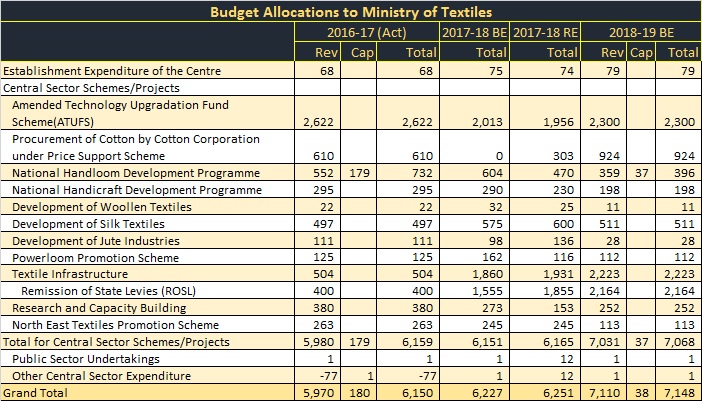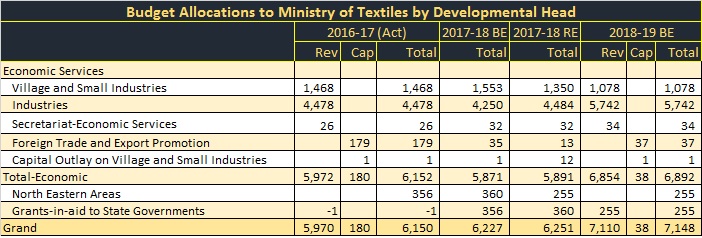Textile budget to spend more money on cotton not sown yet
Textile budget have long been a “Give Me More and No More” battle for both sides. While the textile industry reiterates that it is the second largest employment generator for the economy while budget does not go beyond just acknowledging this fact. Textile Beacon attempts to decipher the textile budget 2018 numbers printed in the Budget documents.
The union budget 2018 has allocated Rs7,148 crore to the ministry of textile for the fiscal year 2018-19, as against Rs6,251 core in 2017-18 (revised) and Rs 6,227 crore (budgeted). So, the increases for the ensuing year works out to a little above 14% from the revised estimates and budgeted for 2017-18. Deciphering the allocations in 2018-19, it appears that only three heads of expenditures are given higher allocations, the rest are trimmed 30-70% compared to both Budget and revised estimates for 2017-18.
More money to buy cotton
Allocation for procurement of cotton by Cotton Corporation under Price Support Scheme, has been pegged at Rs924 crore in 2018-19 as against Rs303 crore in 2017-18 revised and nil in budget. This not only clearly shows the government’s attention to farmers woes but also eyeing the general elections next year.
In 2016-17, the actual spend on cotton procurement was Rs610 crore. 2018-19 get about 300 crore more than the amount spent in 2016-17. The revised numbers for 2017-18 is Rs.303 crore and this is to be spent in fiscal year ending 31 March 2018 and in the peak marketing season which also ends by that time. The Cotton Corporation of India is mandated to undertake Support Price Operation whenever the market price of kapas fall below or touches the minimum support price (MSP). The loss, if any, incurred on account of Support Price Operation is reimbursed to CCI by the government.
So the Rs303 crore, is expected to cover the losses if any of CCI’s intervention in the market by March 2017-18. The MSP is pegged at Rs4,320 for long staple and Rs4,020 core short staple. Spot prices are still hovering above the MSP and their falling below those levels seem far away.
Higher allocation in 2018-19, is inexplicable since the next season crop is not yet sown and MSP not worked out. It is apparent that MSP for 2018-19 season will be raised so much that they have to be above MSP level for consuming such huge amount. Further, such large allocations of revenue nature, only pre-empts funds for other development projects that could take the textile industry to its next level of modernisation.

The other major increase is seen in allocation to Amended Technology Upgradation Fund Scheme (ATUFS). For 2018-19, Rs2,300 crore has been allocated as against Rs1,956 core revised estimates for 2017-18 and Rs2,013 crore Budgeted. This shows that the scheme could not fully absorb the money earmarked for the scheme during 2017-18. The actual expenditure was Rs2,622 crore in 2016-17 which is much higher than allocations in the next two years.
Remission of State Levies (ROSL) scheme is provided a sum of Rs2,164 crore for 2018-19 as against Rs1,855 crore in 2017-18 RE. The scheme provides remittance of State Levies to garments exporters to make the garmenting industry more competitive in global market and also boosting employment in this sector. With total exports of RMG at around Rs120,000 crore the allocation works out to mere 1.5%.
So more than 43% of the textile ministry’s budget will be spent on non-development (cotton buying and remission) and 32% on upgradation schemes. The rest is for economic services, of which, a large portion will be on disbursing salaries and perks to government and quasi-government employees.
The imperative would be that the textile industry, who has for all time relied on government doles, to come out of this shackle and run on its own, as it is still the second largest employment generator after agriculture. The scheme for Integrated Textile Parks which has got just Rs30 crore, can be an ideal member for larger allocations.
